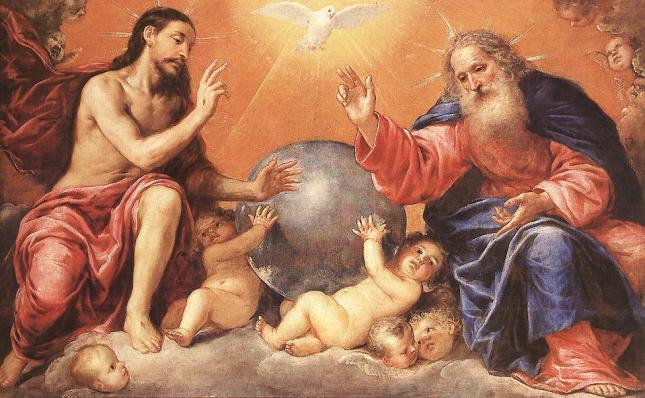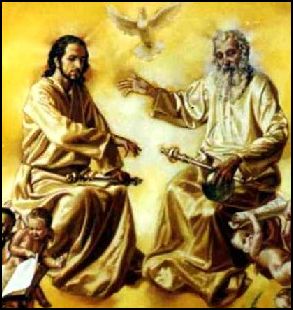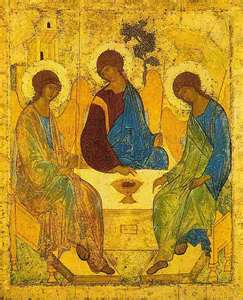THE HOLY TRINITY: THE FATHER, THE SON, AND THE HOLY SPIRIT
(A biblical reflection on the Solemnity of THE MOST HOLY TRINITY- Sunday, 15 June 2014)
Gospel Reading: John 3:16-18
First Reading: Exodus 34:4b-6,8-9; Psalms: Daniel 3:52-56; Second Reading: 2Corinthians 13:11-13
The Scripture Text
For God so loved the world that He gave His only Son, that whoever believes in Him should not perish but have eternal life. For God sent the Son into the world, not to condemn the world, but that the world might be saved through Him. He who believes in Him is not condemned, He does not believe is condemned already, because He has not believed in the name of the only Son of God. (John 3:16-18 RSV)
Our faith teaches us that in God there are three persons. We call the first person “Father.” When we speak of Goad as “Father” we could just as easily say “Mother” or, better still, “Parent,” for in God there is no sex. Nonetheless, when you say the word “father,” you necessarily imply the existence of another person, the child. Fatherhood is a quality which is then added to his person. A father is a man, a person, long before he becomes a father.
God is a Father, and this name necessarily implies another person, the Son. But God did not become a Father. In fact, there was no time when He was not Father, for fatherhood is not a quality which is added to God. God the Father is fatherhood personified. Remember that being a father means giving life to another. From all eternity God the Father gives life to His Son, and the only thing that makes Him a distinct person is the fact that He gives life to His Son. God the Father does not have a relationship to His Son. He is the relationship itself.
God is also a Son, a Child. A child is one who receives life from another. We are children of our parents, but being a child does not exhaust our personhood. We are persons in our own right, which we can see from the fact that when our parents die we continue to exist. But the only thing that makes God the Son a person is the fact that He receives life from His Father. God the Son does not have a relationship to the Father. He is that relationship.
Between parents and their children, in a good home, there is a bond which we call “love.” Love is difficult to describe. It is a warmth, and affection, a feeling – and most important of all it is a bond which unites people. Love is many things, but the only thing that love is not, in our experience, is a person. In God love is a person. Between God the Father and God the Son there is a bond of union, uniting them in love. In God this bond is the Holy Spirit. The Holy Spirit does not give a relationship of love to Father and Son. He is love personified.
The truth of the Trinity has an important bearing on how we should live. Some people wonder why in church, where we come to worship God, we hear so much about how we are to treat people. But think about if for a moment. We believe that we are made in the image and likeness of God. We are called to become like God Himself. The Trinity shows us three person, each of whom is entirely unselfish and each of whom is a real person only in relationship to another. The Father gives Himself completely to His Son. The Son in concerned only with looking to the first person as His Father. The Spirit exist only to unite Father and Son in an eternal embrace of love.
Our fulfilment as human beings comes about only in our relationships with God and other people, and not in being turned inward upon ourselves. Our greatest happiness comes from being generous and unselfish. Reflect on people who think only of themselves – people who are so wealthy; for example, that their whole lives are taken jup with pleasure and play. We may be tempted to envy such people until we hear that their marriage has ended in divorce, or that they have turned to drugs in an attempt to alleviate boredom, or worse still that in complete despair they have taken their own lives. On the other hand, the happiest and most fulfilled human beings are the saints, men like Saint Vincent de Paul [1581-1660] who devoted himself to the salvation of the destitute people of France, and women like Blessed Mother Teresa of Calcutta [1910-1997], who dedicated her life the poorest of the poor in India and many other places in the world.
After serious reflection we can see that our own greatest happiness has come when we have tried to get out of ourselves, when we have made the effort to be unselfish and generous toward someone else, whether a member of our family or otherwise. God’s revelation of Himself as three persons tells us that we find fulfilment not as rugged individuals but in relationships to other people, and that we come to happiness not in selfishness but in genuine concern and love for those around us. In being generous and loving we begin to match the image according to which we are made, a God in whom there are three persons whose whole being consists in unselfishness.
PRAYER: Almighty, eternal, just and merciful God, grant us in our misery that we may do for your sake alone what we know you want us to do, and always want what pleases You; so that, cleansed and enlightened interiorly and fired with the ardour of the Holy Spirit, we may be able to follow in the footsteps of Your Son, our Lord Jesus Christ, and so make our way to You, Most High, by Your grace alone, You who live and reign in perfect Trinity and simple Unity, and are glorified, God all-powerful, for ever and ever. Amen. (A prayer of SaintFrancis of Assisi [1224] at the close of his Letter to a General Chapter).





